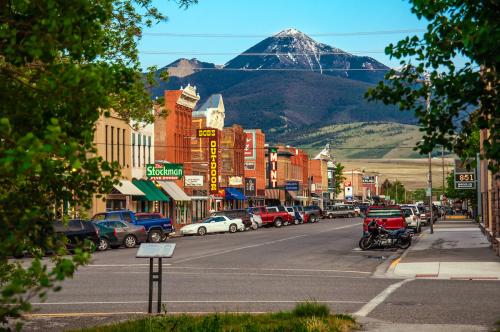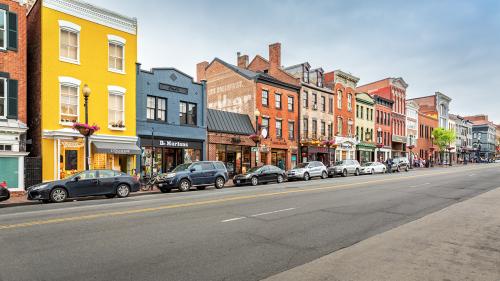Today, after a two-step process that began in June 2023, the Economic Development Administration (EDA) announced the first awardees of its new Recompete Pilot Program grants. These awards represent one of the boldest evolutions in U.S. policy and another manifestation of the Biden administration’s emphasis on place-based policy focused on transforming the economic futures of the nation’s most left-behind places.
Authorized at $1 billion in the CHIPS and Science Act with other new place-based programs but receiving a current appropriation of just $200 million, Recompete represents a big bet on locally led development: Its large, flexible investments are supporting plans that have been designed and will be implemented by local leaders, who are seeking to enable measurable renewal in some of the most economically distressed places in the country.
Local stakeholders and partners submitted plans to revitalize local industries, create new businesses, provide support to local workers, and address addiction and social issues—all with the intent to improve prime-age employment during the five-year grant period. Recompete is the first federal program to use a new measurement standard, the prime-age employment gap (PAEG), aimed at making detectable improvements in local labor force participation. Two types of geographies were eligible to apply: either larger local labor markets with prime-age employment 2.5% or more below the national average, or smaller local communities with prime-age employment 5% or more below the national average. All Tribal lands and U.S. territories were eligible as well.
The interest in Recompete set records
The program’s initial phase set a record for the most applications received for a national EDA program, with 565 submissions requesting more than $6 billion combined.
In December 2023, EDA selected 22 Phase 1 finalists from that pool, inviting them to apply for Phase 2 implementation awards. At the same time, it awarded 24 Strategy Development Grants, each between $250,000 to $500,000, to assist 15 finalists and nine others in local coordination and planning.
The six Phase-2 awards announced today total approximately $184 million, with awards that range from $20 million to $40 million.
Recompete awards are supporting a diverse selection of communities, regions, and activities
Three of the six awardees are fully rural: the North Olympic Peninsula Plan in Washington, the Wind River Indigenous-based Economy Plan in Wyoming, and the Eastern Kentucky Runway Plan in Kentucky. The Eastern Kentucky Runway Plan will also provide sub-awards to St. Claire HealthCare and its partners, another Phase I finalist.
The other three awardees, the City of Allentown in Pennsylvania, Oasis Expansion in San Juan, Puerto Rico, and Reinvest Northwest: Birmingham Career Accelerator in Alabama, are all fully urban.
The largest award—approximately $40 million to the Eastern Kentucky Runway Plan—will be located in central Appalachia. Other locations range across an array of geographies across the country, from the post-industrial northeast (Allentown, Pennsylvania) to the Black Belt in the southeast (Birmingham, Alabama), Native lands in the Plains (the Wind River Indian Reservation in Wyoming), the coast in the Pacific Northwest (Olympic Peninsula, Washington), and Puerto Rico (San Juan).
In addition to large gaps in prime-age employment, all awards are going to areas that are experiencing poverty rates above the national average, sometimes far above: Almost one of every two people in the neighborhoods being served in San Juan live below the poverty line. Two awards are in places experiencing persistent poverty, defined as having a poverty rate above 20% for at least three decades.
The combination of substantial flexibility, grant size, and duration gave local stakeholders the ability to craft strategies that fit their unique assets, histories, and opportunities. Eligible activities also included services such as child care or other wraparound services that EDA has not historically funded yet that impact employment, job quality, and wages.
For example, the Northern Olympic Peninsula Recompete Coalition, affected by losses in the timber industry, will seek to increase production capacity for a collaborative manufacturing effort that uses new technology to make high-tech laminations and create new forestry jobs on local Makah tribal lands. Yet in addition to such traditional economic development activity, it will also support a variety of service organizations in the area, from county agencies to YMCAs, Tribes, and faith-based organizations, to strengthen services such as child care, food assistance, or transportation that can help overcome barriers to employment.
Rural areas will receive a majority of the funds from this round of Recompete awards
The funds awarded to the three fully rural grantees equal $100 million of the $184 million awarded today.
The strong showing by rural places is not random. In an earlier analysis, we found that approximately 60% of the U.S. rural population lives in a place eligible for Recompete.1 Nearly half of all the geographic entities eligible to apply were rural, representing just over a quarter of the total eligible population.
Recompete’s innovative program design helped level the playing field for rural areas with limited administrative and fiscal capacity, despite the absence of a specific funding set-aside or other type of special targeting for rural places.
The extended application for Phase I allowed places with limited staff capacity to put serious submissions together. By forgoing matching funds requirements and remaining agnostic to size (rather than advantaging scale on a per-capita basis), Recompete’s design left out program parameters that many rural communities often experience as barriers in other federal programs.
Within its eligible areas, Recompete applicants were given the flexibility to self-define their service area, choosing to serve either the entire area or a subset, and to apply as a single organization or as a coalition. The local determination allowed applicants the chance to put forward natural coalitions and authentic coverage areas, rather than stretching beyond the limits of their existing networks and relationships for the sake of a grant application.
For example, the varied nature of the activities planned by the Eastern Kentucky Runway Plan, as well as the breadth of its 12-county geographic scope, would simply not fit the thresholds or uses of funds of other federal programs supporting rural development.
Next steps must maximize the lessons and opportunities represented by Recompete
It is rare that places experiencing deep disadvantage in the U.S. effect a lasting turnaround. Recompete seeks to meaningfully improve the track record of policymakers in addressing significant economic distress.
The program posits that such turnarounds require substantial up-front and consistent investment, as highlighted in an analysis by Tim Bartik for Brookings Metro, which provided the formula basis for the original Recompete legislation sponsored by Rep. Derek Kilmer (D-Wash.). Recompete’s approach also mirrors the recommendations we made in 2020 to modernize the effectiveness of federal policy in transforming left-behind rural places: flexible, substantial, multi-year grants to support comprehensive solutions designed and implemented by local people, rigorously measured to track results.
The next steps that EDA takes in supporting these awardees with ongoing technical assistance, peer exchange, and expertise and tools will be exceptionally important in helping them be successful. Today’s awards will offer the opportunity to collect new data and evidence on local interventions that exhibit impact and test the effectiveness of Recompete’s unique approach. Yet the sample size is small.
The overwhelming response to Recompete’s initial call for proposals demonstrates that a huge appetite exists across the country’s struggling places for this type of investment. Local leaders and communities are ready with a vision for their new economic futures, if given the chance.
Recompete’s current appropriation is significantly smaller than the $1 billion authorized in the CHIPS and Science Act. Full funding could significantly expand our understanding of what works in renewing the stranded assets and human capital in too many parts of the country, while broadening the geographic distribution of economic opportunity across the country. Congressional action and additional support would be an important step in building on the promise of today’s announcement.
-
Footnotes
- Using OMB’s “non-metro” designation as the definition for “rural.”
The Brookings Institution is committed to quality, independence, and impact.
We are supported by a diverse array of funders. In line with our values and policies, each Brookings publication represents the sole views of its author(s).







Commentary
New Recompete awards seek to jump-start economic renewal, from Rust Belt to rural places
August 5, 2024